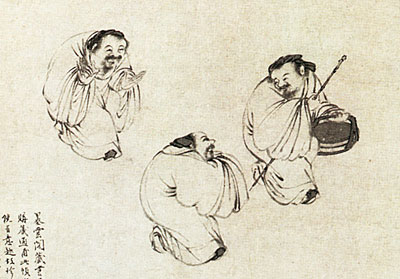
|
|
|

Is there a difference between love and addiction? Is being addicted to love a disease? […]
A group of French researchers, publishing in The American Journal of Drug and Alcohol Abuse, describe the clinical distinctions between “love passion,” “love addiction,” and “sex addiction”. Using advances in neurobiology to compare clinical, neuropsychological, neurobiological, and neuroimaging data on love and passion.
They begin with the most pertinent question: “Is there any legitimate reason to associate a pathological condition (addiction) and a natural, pleasurable one [love]?” […]
“Addiction would be defined as the stage where desire becomes a compulsive need, when suffering replaces pleasure, when one persists in the relationship despite knowledge of adverse consequences (including humiliation and shame).”
The fact that there is currently no data on the epidemiology, genetics, co-morbidity, or treatment of love addiction lead the researchers to conclude that to place some cases of “love passion” within a clinical disorder spectrum […] would be premature.
{ science left untitled | Continue reading }
mystery and paranormal, psychology, relationships |
June 14th, 2012

Country number four, Spain, gets bailed out and we all of course know that it won’t be the last. Though I wondered over the weekend whether perhaps I was missing something, because when the Spanish prime minister Mr Rajoy got up, he said that this bailout shows what a success the eurozone has been.
And I thought, well, having listened to him over the previous couple of weeks telling us that there would not be a bailout, I got the feeling after all his twists and turns he’s just about the most incompetent leader in the whole of Europe, and that’s saying something, because there is pretty stiff competition. […]
I tell you, any banking analyst will tell you, 100 billion does not solve the Spanish banking problem, it would need to be more like 400 billion.
{ Nigel Farage | Continue reading }
economics, within the world |
June 13th, 2012

NASA has lost data from some of its earliest missions to the moon because the machines used to read the tapes were scrapped and cannot be rebuilt. A wise librarian will wish to keep in working order a few antique computers that can read such ancient technologies as CDs and USB thumb-drives. […]
Conscientious institutions already make copies of some web pages, e-books and other digital material, and shift the data to new hardware every five year. […]
Mistakes 30 years ago mean that much of the early digital age is already a closed book (or no book at all) to historians.
{ The Economist | Continue reading }
image { Larry Sultan and Mike Mandel }
incidents, technology |
June 13th, 2012

Delaying fatherhood may offer survival advantages, say US scientists who have found children with older fathers and grandfathers appear to be “genetically programmed” to live longer. […]
Experts have known for some time that lifespan is linked to the length of structures known as telomeres that sit at the end of the chromosomes that house our genetic code, DNA. Generally, a shorter telomere length means a shorter life expectancy.
{ BBC | Continue reading }
genes, health, kids |
June 13th, 2012

{ The two lower curves in beige and green show the instantaneous luminosity measured by the two largest detectors operating on the Large Hadron Collider (LHC), CMS and ATLAS. […] I called the LHC control room to find out what was happening. “Oh, those dips?”, casually answered the operator on shift. “That’s because the moon is nearly full and I periodically have to adjust the proton beam orbits.” | Quantum Diaries | Continue reading }
mystery and paranormal, science, technology |
June 13th, 2012

Historically, casinos have been eager adopters of technologies that help them to gather knowledge about their customers. The knowledge-gathering repertoire of the modern casino has shifted from telephone surveys, focus groups, and rudimentary datasets to complex feats of reconnaissance and analysis enabled by player tracking systems, data visualization tools, and behavioral intelligence software suites.
Many surveillance techniques first applied in casinos were only later adapted to other domains—airports, financial trading floors, shopping malls, banks, and government agencies. […]
Nearly 70 percent of casino patrons in the United States participate in so-called loyalty programs, using player cards to gamble rather than coins, paper money, or tickets. While their participation grants them redeemable points based on the volume of their play, it grants casinos a wealth of information. Casino player tracking systems, inspired by airline and credit card reward programs in the mid-1980s, record the value of each bet gamblers make, their wins and losses, the rate at which they push slot machine buttons, and what drinks and meals they purchase.
Tracked gamblers are treated less as individual subjects than as “dividuals” in the Deleuzian sense—collections of traits, habits, and preferences that casinos can systematically compare to those of others in order to identify distinct customer niches.
Harrah’s, a franchise that tracks players seamlessly from coast to coast by pooling information from its national chain of properties into a single centralized database, parses its market into ninety different segments and addresses each with a unique marketing scheme. […]
As in the case of online venues like Amazon.com, individuals’ consumer behavior in casinos, recorded in a common data cloud and refracted through statistical analysis, becomes the basis for group classifications of which they may not be aware but in which they continue to participate—sometimes more robustly as a result of the customized product marketing that follows.
{ Limn | Continue reading }
economics, psychology, vegas |
June 12th, 2012

China is a kleptocracy of a scale never seen before in human history. This post aims to explain how this wave of theft is financed, what makes it sustainable and what will make it fail.
{ Bronte Capital | Continue reading }
artwork { Li Shida }
asia, economics, uh oh |
June 12th, 2012

A father’s love contributes as much — and sometimes more — to a child’s development as does a mother’s love. That is one of many findings in a new large-scale analysis of research about the power of parental rejection and acceptance in shaping our personalities as children and into adulthood.
{ EurekAlert | Continue reading }
kids, psychology, relationships |
June 12th, 2012

You know the young Marx – I don’t idealise Marx, he was a nasty guy, personally – but he has a wonderful logic. He says: ‘You don’t simply dissolve marriage; divorce means that you retroactively establish that the love was not the true love.’ When love goes away, you retroactively establish that it wasn’t even true love. […]
For me, the idea of hell is the American type of parties. Or, when they ask me to give a talk, and they say something like, ‘After the talk there will just be a small reception’—I know this is hell. This means all the frustrated idiots, who are not able to ask you a question at the end of the talk, come to you and, usually, they start: ‘Professor Žižek, I know you must be tired, but …’ Well, fuck you. If you know that I am tired, why are you asking me? I’m really more and more becoming Stalinist. Liberals always say about totalitarians that they like humanity, as such, but they have no empathy for concrete people, no? OK, that fits me perfectly. Humanity? Yes, it’s OK—some great talks, some great arts. Concrete people? No, ninety-nine percent are boring idiots. […]
I especially hate when they come to me with personal problems. My standard line is: ‘Look at me, look at my tics, don’t you see that I’m mad? How can you even think about asking a mad man like me to help you in personal problems, no? […]
They claim sex is healthy; it’s good for the heart, for blood circulation, it relaxes you. They even go into how kissing is also good because it develops the muscles here – this is horrible, my God! […]
I like this idea of sex as part of love, you know: ‘I’m ready to sell my mother into slavery just to fuck you for ever.’ There is something nice, transcendent, about it. I remain incurably romantic.
{ Slavoj Žižek | Continue reading }
related/recommended { The Pervert’s Guide to Cinema }
photo { Fernando Gregory }
experience, ideas, relationships |
June 11th, 2012

Researchers have found a way to predict a news story’s popularity — with an astounding 84 percent accuracy.
{ The Atlantic | full story }
images { Twitter Batman | New Twitter bird }
science, social networks, technology, visual design |
June 11th, 2012
sleep, technology |
June 11th, 2012

A couple of online articles have discussed whether you would be conscious of being shot in the head with the general conclusion that it is unlikely because the damage happens faster than the brain can register a conscious sensation.
While this may be true in some instances it ignores that fact that there are many ways of taking a bullet to the head.
This is studied by a field called wound ballistics. […]
Firstly, if you get shot in the head, in this day and age, you have, on average, about a 50/50 chance of surviving.
{ MindHacks | Continue reading }
photos { Irving Penn | Larry Sultan and Mike Mandel | more }
guide, guns, health, photogs |
June 11th, 2012

Scientists have now found the engram, the physical trace of memory in the brain. […]
Decades of scientific dogma asserted that engrams exist only in vast webs of connections, not in a particular place but in distributed neural networks running widely through the brain. Yet a series of pioneering studies have demonstrated that it is possible to lure specific memories into particular neurons, at least in mice. If those neurons are killed or temporarily inactivated, the memories vanish. If the neurons are reactivated, the memories return. These same studies have also begun to explain how and why the brain allocates each memory to a particular group of cells and how it links them together and organizes them—the physical means by which the scent of a madeleine, the legendary confection that sparked Marcel Proust’s memory stream, leads to remembrance of things past. […]
“We have now gotten to the point that we know enough about memory and how memories are formed that we can actually find the engram, and by finding it, we can manipulate it,” says neurobiologist Alcino Silva.
{ Discover | Continue reading }
image { Stefano Colombini }
memory |
June 11th, 2012

There are billions upon billions of ad and spending dollars in our phones, waiting to be snatched up. Why can’t big, cynical corporations capture them? […]
We thought they were like laptops with different screens. We were, Gassée writes, very wrong.
{ IT World | Continue reading }
image { Karin }
unrelated { Raunchy dance routine a PR nightmare for Microsoft: “The words MICRO and SOFT don’t apply to my penis.” | GeekWire }
economics, marketing, technology |
June 11th, 2012

Why product prices end in 99p. […]
There are two theories at play here. The first, called the “left digit effect”, suggests that consumers can’t be bothered to read all the way to the end of a price. “£79.99” reads as “70-something pounds”. The alternative theory is that a price ending in 99p is simply a shorthand for good value. […]
It’s easy to imagine that the shorthand for a bargain was once a 99p price, but now it’s a nice round number thanks to the pound shops. […]
A $59 dress, for instance, would sometimes be priced at $54 or $64 instead. Mr Anderson and Mr Simester found that prices ending in “9” were more likely to find buyers, relative to the prices ending in “4”. This was always true but particularly if the product in question was something new. That last fact does suggest that the “9” was conveying overtones about an unfamiliar product. It’s some support for the “shorthand” theory.
{ Tim Harford | Continue reading }
economics |
June 11th, 2012

For some people with insomnia, the real reason they can’t fall asleep may be a fear of the dark, a small new study suggests.
93 undergraduate students […] 46 percent of the poor sleepers were afraid of the dark, whereas 26 percent of the good sleepers seemed to have this fear. […]
“We can treat this fear,” she said. “We can get people accustomed to the dark so they won’t have that added anxiety that contributes to their insomnia.”
{ LiveScience | Continue reading }
psychology, sleep |
June 11th, 2012

A new study published in PLoS One shows that chili seeds can perceive nearby plants even if these are enclosed in boxes. As it was not possible that the enclosed vegetables could communicate through air or soil, researchers believe that plants may be able to hear sounds.
{ United Academics | Continue reading }
photo { Raymond Meeks }
Botany, noise and signals, science |
June 11th, 2012

Body image is a subjective experience of appearance. It’s an accumulation of a lifetime’s associations, neuroses and desires, projected on to our upper arms, our thighs. At five, children begin to understand other people’s judgement of them. At seven they’re beginning to show body dissatisfaction. As adults 90% of British women feel body-image anxiety. And it doesn’t wane – many women in their 80s are still anxious about the way their bodies look which, Professor Rumsey explains, can even affect their treatment in hospital, when their health choices are influenced by aesthetics. […]
We’re no longer comparing ourselves to “local images” – our friends – instead we’re comparing ourselves to social-networked strangers, celebrities, and to Photoshopped images, of which we see around 5,000 a week. […] The problem is not the Photoshopping itself – the problem is that Photoshopped images threaten to replace all others.
{ Eva Wiseman | Continue reading }
polaroid { Robert Whitman }
health, ideas, psychology |
June 11th, 2012
kids, showbiz, weirdos |
June 11th, 2012




















